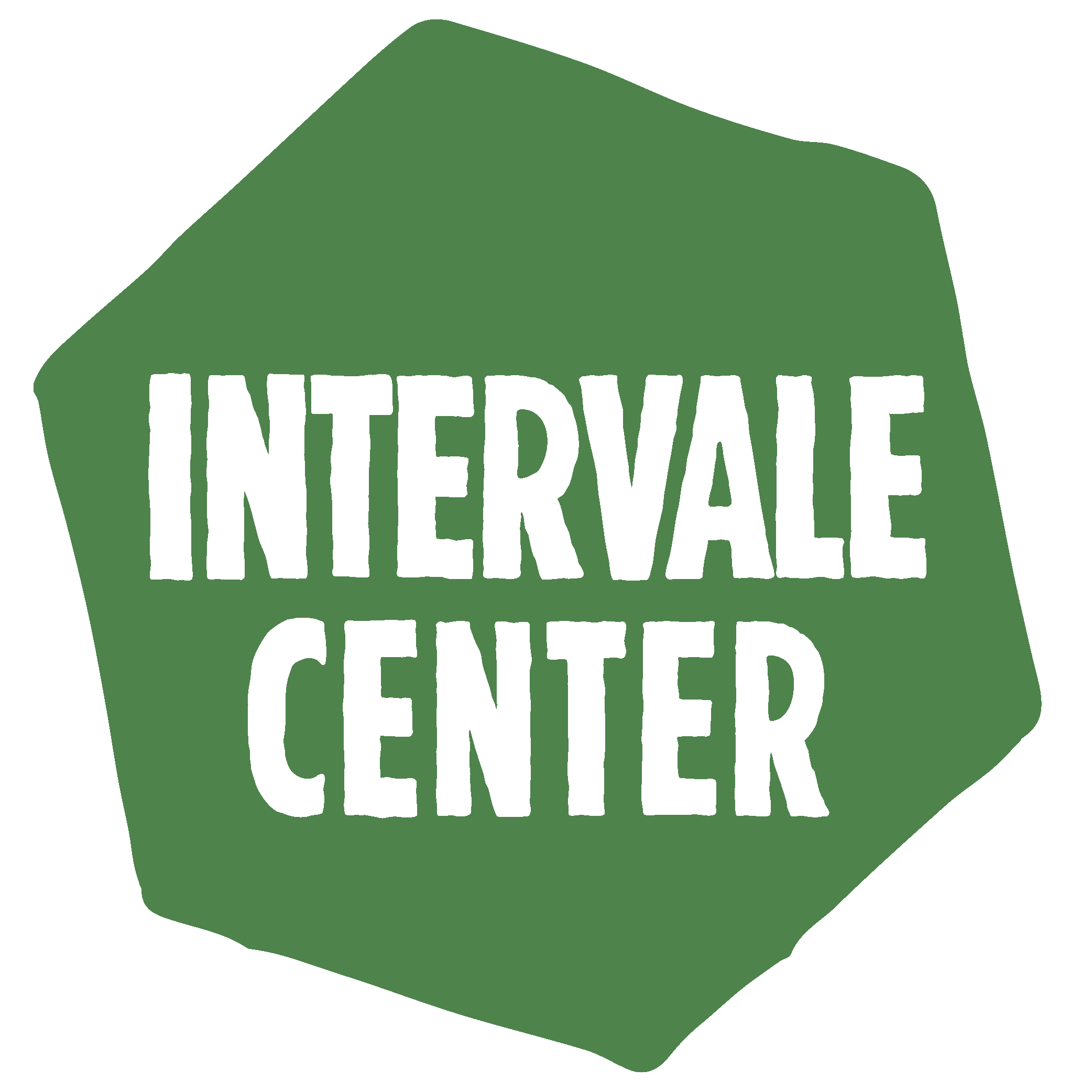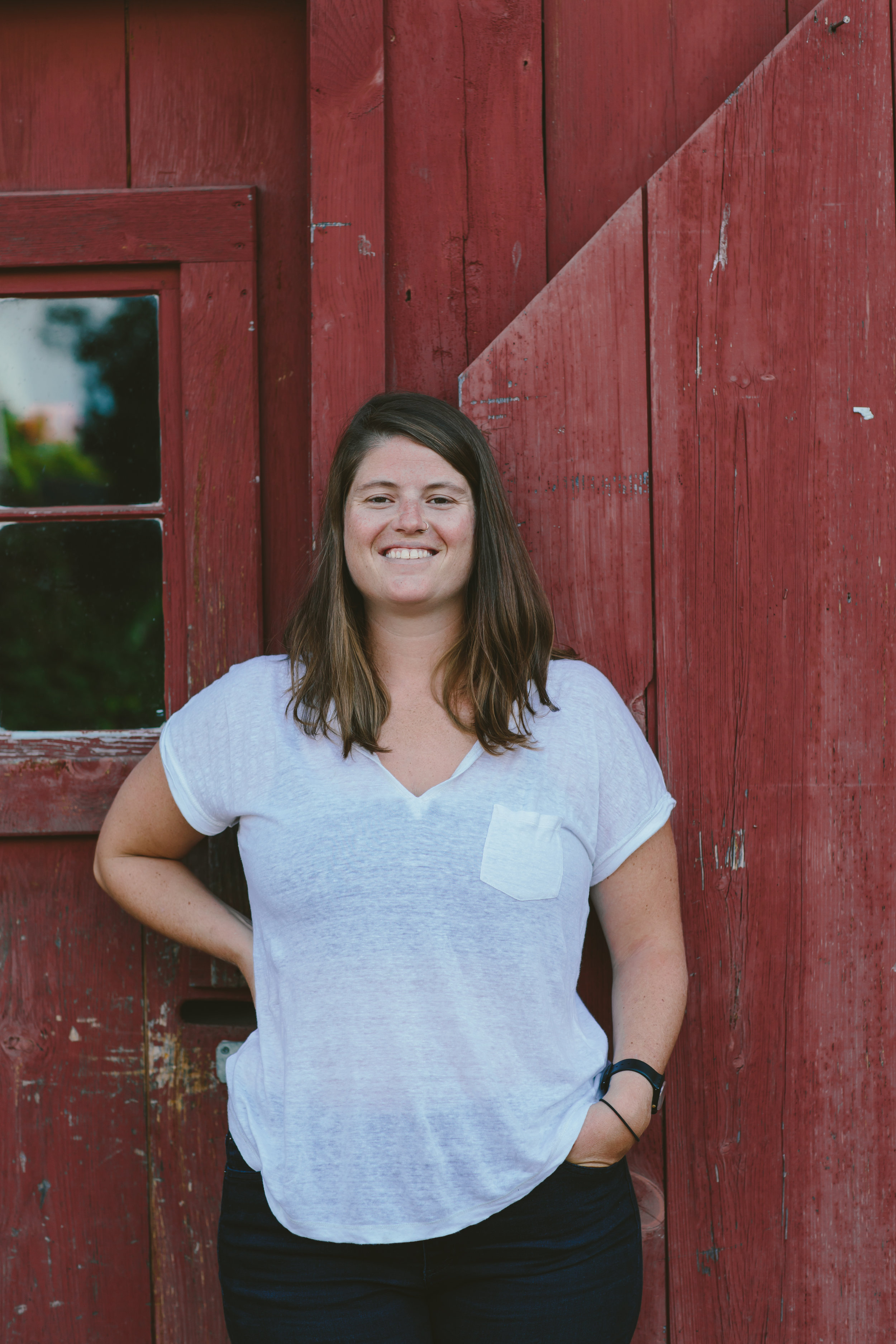Staff Spotlight: Maggie Donin
By: Eleanor Lustig, Development Intern
Community in Farming: An Interview with Maggie Donin
As the Intervale Center’s Beginning Farmer Specialist, Maggie spends most of her time working with our Ag Services team. She travels to farms throughout the state to provide beginning farmers with business planning advice and other technical assistance. In addition, she recruits aspiring farmers to our Incubator Farm Program, and checks in on the current incubator farms to make sure that they have everything they need. Another big part of her job is sharing the work we do here at the Intervale Center with other organizations throughout the country, particularly with the National Incubator Farm Training Initiative Network.
Maggie worked on a number of farms before she began working for the Intervale Center in 2012, first at the student-run farm at UVM and finally on her own small farm with her partner John. She became interested in farm support services during her time as a farmer, which lead her to the Intervale Center. I asked her some questions to find out more about what drew her to farming, and what she finds carries over to her work here at the Intervale Center.
How did you get interested in sustainable agriculture?
“I didn’t go into college with any experience farming. When I got to UVM I was really just looking for a community of people who were united around something that felt genuine—something that felt important and useful—to me. I started going for work days at the student-run farm and joined the farm crew, then was employed there for a summer. It felt right—you got to work with your body, you got to work with other people, and you formed bonds really fast. community, it felt really comfortable to me and it felt really real.
How does your experience farming inform the work you do at the Intervale Center?
“I don’t think you could do this job if you didn’t have some farming experience, and having more experience would only have benefitted my work here. I tend not to work with farmers on operational stuff related to soil science, cover-cropping, or pests and disease, because there are people in the state who have a lot more knowledgeable about those things. I bring those people in to help farmers on those issues, and I provide direct service on business and financial planning.
What were the greatest takeaways from your experience as a farmer?
“I think an understanding that money isn’t everything--I was so amazed by how much farmers’ values drove them towards what they decided to do. I realized how important these farms are for communities. Also, I think it made me realize how important physical activity is in my life.
Farming requires a diverse array of skills--what do you think are the most valuable traits for a farmer to have?
“Perseverance is important. There are a lot of things that will get in your way, and you can’t get discouraged easily. Then also you have to be able to see the big picture as a business manager. You need to understand when its not worth it to harvest a crop, because it would take too much time and cost too much. You have to understand how each crop relates to your overall business.
One thing that I’ve noticed about a lot of farmers—I don’t know if it’s a skill they need or what—is that they can stop in the middle of their day and have a really nice interaction with someone or laugh or take a break. You have to be able to take a break and you have to be able to let things go. There is always going to be more work to do and if you obsess about every little thing, you’re just going to be overwhelmed and the day is never going to be done.”
What is the most interesting part of your job?
I get to interact with a lot of different people. I get to go to their houses and see their farms. I get to talk to people about what’s really going on in their lives, and I like that. There’s a sort of therapy element to it—you get into some really personal stuff with people, which is hard but fun and really important to me. You do have to create some separation between yourself and the person you’re working with—you can’t take on their problems. I also really like that I get to work with my peers.
Is there any work you feel needs to be done, but is missing from the Intervale Center’s array of programs?
There’s a lot of policy work to be done that we’re not doing super actively. I think we do play a role in policy, and that we’re not necessarily the ones to do it, but there is certainly work to be done to level the playing field for small and midsized farms.
Where do you see the future of farming in Vermont headed?
I think we need to figure out what’s going to happen with dairy. Dairy is one of the biggest drivers of Vermont’s agricultural economy, and it’s scary to see farms have to fold. I realize there are a lot of challenges with dairy but I don’t want our state’s culture around dairy farming to go away… I’m hopeful that organic dairy and grass-based dairy will really grow. I also hope that grass-based livestock production continues to grow. Vermont has a lot of great land for vegetables, but it also has a lot of amazing land for grazing and growing grass. Lastly, I think collaboration is going to be really important amongst farms, whether its multi-farm co-location on a property, or collaboration on markets and trucking.
What do you think is the biggest problem facing the world today?
I think isolation between groups of people and amongst individuals. I think that a lot of people don’t understand problems like climate change, for instance, because they’re not connected to other humans. That’s why I really like this work—it’s very human to human. I can’t go in and give people the answers to their business problems, but I can say, “I’m a person who is here to listen to you and help you think through your ideas and tell you that you are not alone.” If you need to call me on the weekend because you’re freaking out about something, you can do that.
What are your dreams for the future?
Continue to get to know myself better. This work makes me look into myself and I’ve grown a lot--I’ve really had to dig deep into my own insecurities around being a woman, and feeling comfortable telling people what to do. I hope to continue this process of growth and to keep building skills and knowledge and confidence in my work. I want to own land one day and have either a homestead or some kind of little farm business. I’m a yoga teacher as well so I’d like to continue to do that and find ways to integrate that into my life.
How did you get into yoga and decide to become a yoga teacher?
I like yoga because its a new way to get to know myself. I found a teacher here in Burlington who I really resonated with—the things she said in class were so real, and not esoteric or anything. I did a yoga teacher training because it worked out with my schedule, and because I wanted to get deeper with it. I didn’t originally want to teach but I ended up getting into it and its just grown from there.

